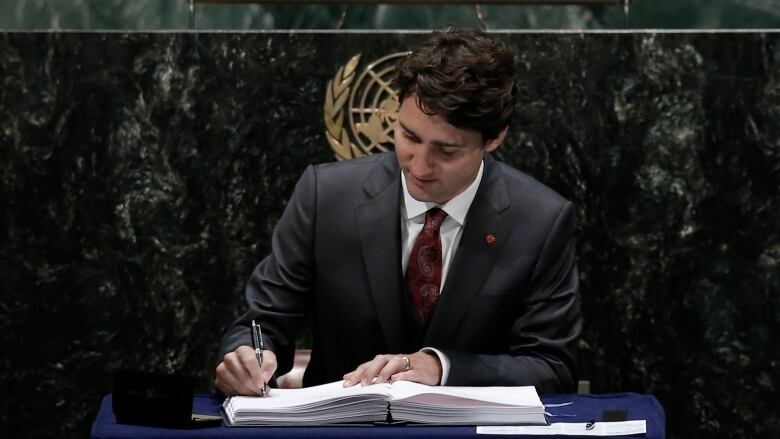Trudeau government close to unveiling plan to hit net-zero emissions by 2050
But the legislation isn't likely to include an enforcement mechanism and Canada has never met its targets

The federal government is set tointroduce climate accountability legislation as early as next week to formally commit Canada to its targetof net-zero greenhouse gas emissions by 2050.
The long-awaited bill will set out mandatorynationalfive-year targetsto cut emissions, startingin 2025.
While the Liberal government has promised the five-year targets will be "legally binding," the legislation isn't likely toinclude an enforcement mechanism to ensure those targets are being met.
The task of coming up with toolsto enforce nationally legislated emissions targets likely wouldfall to a net-zero advisory group the federal governmenthas not yetestablished. One key hurdle facing Ottawaisgetting the provinces on board with reporting mechanisms particularly the oil-producing provinces of Alberta and Saskatchewanstill pursuing a court challengeofthe federal price on carbon, which isset to rise to $50 a tonne by 2022.
Carbon output varies greatly from province to province. Most provinces emitbetween 10 and 20 tonnes per capita annually, while per capitaemissions from Alberta and Saskatchewan are close to 70 tonnes.
A history of missing the mark
Canada has set multiple emissions reduction targets in past decades and has never met a single one.
It's also on track to miss its current target by 77 megatonnes, according tothe latest federaldata from 2018.
"Achieving our goals will certainly be challenging and will require leadership from every region of the country," Environment Minister Jonathan Wilkinson told a hearing of the House of Commons environment committee last week.
Many environmentalists and climate policy experts in Canada look at legislation asa way to forcecurrent and future governments to make good on their climate promises as long as thetargets areset in law and are accompanied by carbon budgets that show how and when each jurisdiction would cut emissions.
The U.K's climate legislation in place since 2008 and widely regarded as the global gold standard for emissions reduction law includes bothcarbon budgets and a publicly-funded committee of experts that monitors government progress.
Emissions plan sidelined by pandemic
The soon-to-be-tabled climate accountability legislation is the first step in what sources tell CBC News will be a series of federal measures, rolling out over the coming weeks, meant to ensure that Canadalives up to its commitments at the UN climate conference in Paris five years ago. Those commitments include a promiseto cut emissions by 30 per cent below 2005 levels by 2030 a target the Liberal government promised to exceed in the last federal election.
Initial plans to introduce the legislation earlier this year were derailed by the pandemic, along with other key parts of the Liberal environmental platform such as new rules for cleaner-burning fuels and a promise to plant two billion trees.
In its throne speechback in September, the federal governmentpromisedto "immediately" bring forward its 2030 climate targets plan.
Sources tell CBC News the government's climate plan was approved by cabinet last month but criticsremain concernedabout Canada's path to net-zero, which would require significantly reducing the country's carbon emissions and offsetting the remaining emissions with other measures, such as planting trees or carbonsequestration.
Next month, the government is expected to roll outnew standards for cleaner-burning fuels which couldaccount for about 15 per cent of Canada's greenhouse gas emissions reduction target and to beginsector-by-sector consultations to set reduction targets, offerincentives to increase the use of clean energyanddevelop the market for electric vehicles.
The federal government also haspromised a national hydrogen strategy this fall a key component of its net-zero emissions strategythat would identify potential industrial uses for hydrogen as a fuel source.













_(720p).jpg)


 OFFICIAL HD MUSIC VIDEO.jpg)
.jpg)



























































































